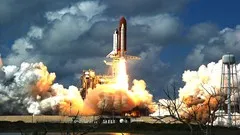
Interplanetary Spacecraft and Satellite Engineering 
Discover the fascinating world of Interplanetary Spacecraft and Satellite Engineering in this comprehensive course. Delve into the intricate components and systems that make up a spacecraft, gaining a clear understanding of their design and engineering. From space environment and orbital mechanics to communications and power systems, explore a wide range of topics including radiation mechanics, mission definition, and spacecraft dynamics. By the end of the course, you'll not only be able to operate spacecraft instruments but also design your own spacecraft like a true rocket scientist. Embark on this incredible journey today and unlock the secrets of spacecraft engineering. Don't hesitate to reach out with any questions – your instructor is here to help! ▼
ADVERTISEMENT
Course Feature
![]() Cost:
Cost:
Paid
![]() Provider:
Provider:
Udemy
![]() Certificate:
Certificate:
Paid Certification
![]() Language:
Language:
English
![]() Start Date:
Start Date:
2019-12-27
Course Overview
❗The content presented here is sourced directly from Udemy platform. For comprehensive course details, including enrollment information, simply click on the 'Go to class' link on our website.
Updated in [September 05th, 2023]
Skills and Knowledge Acquired:
Spacecraft Components and Systems: Students will gain an in-depth understanding of the various components and systems that make up a spacecraft. This includes knowledge of the structural, propulsion, communication, power, and control systems, among others.
Space Environment: The course will cover the space environment, including topics such as radiation exposure, which is critical for designing spacecraft that can withstand the harsh conditions of outer space.
Orbital Mechanics: Students will learn the principles of orbital mechanics, enabling them to calculate and predict the trajectories of spacecraft in different orbits.
Space Propulsion: The course explores the fundamentals of space propulsion, including the types of propulsion systems used in spacecraft and their applications.
Communications: Students will gain insights into spacecraft communication systems, including how data is transmitted to and from spacecraft in interplanetary missions.
Attitude Control: The course covers attitude control systems, which are essential for maintaining the proper orientation of spacecraft in space.
Power Systems: Students will learn about power generation methods in space, with a focus on photovoltaic power generation and its role in providing energy for spacecraft.
Contribution to Professional Growth:
This course significantly contributes to professional growth by equipping students with the knowledge and skills required to excel in the field of spacecraft engineering. Graduates of this course will be well-prepared to pursue careers in aerospace engineering, satellite design, space mission planning, and related fields. They will have the expertise needed to contribute to the development of advanced space technologies and participate in interplanetary exploration missions, making them valuable assets in the aerospace industry.
Suitability for Preparing Further Education:
For those considering further education in aerospace engineering, space science, or related disciplines, this course serves as an excellent foundation. The skills and knowledge acquired in spacecraft engineering and technology provide a strong basis for pursuing advanced degrees or specialized training. Whether students aim to conduct research, design cutting-edge space systems, or work on space missions, this course prepares them for success in higher education.
Course Syllabus
Introduction
Space Environment
Orbital Mechanics
Space Propulsion Systems
Communications from Space to Earth
Attitude Determination and Control System
Space Power Systems
Course Provider

Provider Udemy's Stats at AZClass
Discussion and Reviews
0.0 (Based on 0 reviews)
Explore Similar Online Courses

Flight Mechanics - From Theory to Certification of Aircraft

Aerospace Engineering: Airplanes Airlines and Airports

Python for Informatics: Exploring Information

Social Network Analysis

Introduction to Systematic Review and Meta-Analysis

The Analytics Edge

DCO042 - Python For Informatics

Causal Diagrams: Draw Your Assumptions Before Your Conclusions

Whole genome sequencing of bacterial genomes - tools and applications

How do Aircraft Engines Work? (FREE COURSE!)

Aerospace Engineering: Aircraft Systems and Avionics


Start your review of Interplanetary Spacecraft and Satellite Engineering